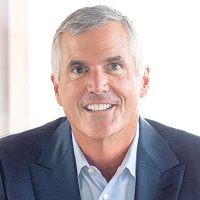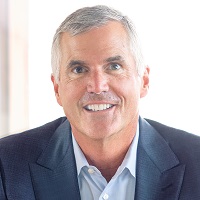Why More Retirees Might Come Out of Retirement
It’s often not solely because of financial reasons, but because of a lack of purpose in retirement. This financial expert can relate.


Profit and prosper with the best of Kiplinger's advice on investing, taxes, retirement, personal finance and much more. Delivered daily. Enter your email in the box and click Sign Me Up.
You are now subscribed
Your newsletter sign-up was successful
Want to add more newsletters?

Delivered daily
Kiplinger Today
Profit and prosper with the best of Kiplinger's advice on investing, taxes, retirement, personal finance and much more delivered daily. Smart money moves start here.

Sent five days a week
Kiplinger A Step Ahead
Get practical help to make better financial decisions in your everyday life, from spending to savings on top deals.

Delivered daily
Kiplinger Closing Bell
Get today's biggest financial and investing headlines delivered to your inbox every day the U.S. stock market is open.

Sent twice a week
Kiplinger Adviser Intel
Financial pros across the country share best practices and fresh tactics to preserve and grow your wealth.

Delivered weekly
Kiplinger Tax Tips
Trim your federal and state tax bills with practical tax-planning and tax-cutting strategies.

Sent twice a week
Kiplinger Retirement Tips
Your twice-a-week guide to planning and enjoying a financially secure and richly rewarding retirement

Sent bimonthly.
Kiplinger Adviser Angle
Insights for advisers, wealth managers and other financial professionals.

Sent twice a week
Kiplinger Investing Weekly
Your twice-a-week roundup of promising stocks, funds, companies and industries you should consider, ones you should avoid, and why.

Sent weekly for six weeks
Kiplinger Invest for Retirement
Your step-by-step six-part series on how to invest for retirement, from devising a successful strategy to exactly which investments to choose.
With ongoing inflation, high interest rates and volatility continuing to impact the market, it isn’t hard to see why Americans are increasingly concerned about outliving their nest egg. As a result, many are rethinking their retirement.
According to a recent survey from F&G, half (50%) of pre-retired and retired Americans are considering delaying or coming out of retirement. Financial factors are certainly a reason, with 52% of pre-retirees worried they won’t have enough money in retirement, and 42% of retirees worried about inflation. But money doesn’t tell the whole story, as the report also revealed that many Americans are returning to work for non-financial reasons — something that I can relate to as well.
Retirement is more than financial independence
Conventional wisdom may say someone would never return to work after retiring unless they were financially forced to, but the reality is many Americans are considering going back to work simply because it makes them feel good. In fact, 50% of retirees are considering “unretiring” because they enjoy the intellectual challenge/stimulation from working, and 36% feel a lack of purpose in retirement.
From just $107.88 $24.99 for Kiplinger Personal Finance
Become a smarter, better informed investor. Subscribe from just $107.88 $24.99, plus get up to 4 Special Issues

Sign up for Kiplinger’s Free Newsletters
Profit and prosper with the best of expert advice on investing, taxes, retirement, personal finance and more - straight to your e-mail.
Profit and prosper with the best of expert advice - straight to your e-mail.
These responses resonated with me. I was briefly retired, then made the decision to return to the workforce for non-monetary reasons, which is how I eventually took on a new challenge at F&G. The report shows more Americans are having the same feelings I had. Earlier in my career, when I thought of retirement, I saw it as synonymous with achieving financial freedom. That was more important to me than the general idea of “stopping work.” I've always enjoyed working and being a part of a team, but with retirement I was excited about having more control over my life and spending more of my time on the things I wanted to pursue.
When I initially retired, I loved having freedom over my day, but this feeling was short-lived. After a while, I noticed myself missing the camaraderie of the workplace. Growing up, I played a lot of team sports, and I didn't appreciate how work had become my “adult team sport” later in life. Ultimately, that feeling of missing something persisted until I made the decision to “unretire” and get back to working again.
The new idea of retirement and how to get there
Just as hybrid work has emerged over the last few years, we’re seeing “hybrid retirement” become more common. Many folks are realizing that the old vision of retirement as working one day, then being completely retired the next is no longer an attractive prospect. Generations are also now wired differently, and people are approaching retirement differently than their parents or grandparents. They want to learn, achieve goals and spend time with other people who share similar passions. So how can they ensure that happens?
Looking back, the best retirement planning advice I received was 1) plan for it in advance, envisioning what your daily life will look like, and 2) don’t overcommit yourself in the first year of retirement.
It’s important to financially plan for retirement, but people approaching retirement also need to plan for their life goals. It’s critical to carefully think through what you'd like retirement to look like. Do you want to travel? Spend more time with family, such as your grandkids? Volunteer? For people in a relationship, especially, it’s easy to make assumptions that can lead to disappointment, so aligning on a common vision is a critical first step. Once someone can identify what will inspire and bring them purpose in retirement, they can make a plan to ensure they are working to achieve it.
Experts can help
One of the best ways people can ensure they are well positioned to achieve the retirement they want, both financially and non-financially, is to speak with a financial adviser or similar professional.
Surprisingly, the survey found that half (50%) of pre-retirees and retirees don’t currently work with a financial adviser. This is a huge missed opportunity for people to get input about their retirement plan and goals. Speaking with an adviser can alleviate concerns around inflation and outliving savings and ensure individuals have the right products to meet their needs. For example, retirees and pre-retirees may want to consider options such as annuities, which can provide peace of mind and guaranteed income for life regardless of what happens in financial markets. For financial advisers, it’s also a chance to look beyond just the portfolio and lean into the role of “life coach” to help clients plan for overall happiness as well.
Ultimately, Americans’ retirement views are changing and moving beyond just financial concerns. Everyone’s life situation, goals and “dream retirement” are different, so there’s no one formula based on age or when or how to retire. For example, for Baby Boomers considering pushing back their retirement, the top reason they are doing so is because they enjoy the intellectual challenge/stimulation from working (51%), whereas for Gen Xers the top reason is tied between being worried about inflation (45%) and wanting more financial options and a larger safety net (45%).
Spending time today reviewing your concerns, understanding your goals and building a plan to get there can pay off for years to come. Once people have that added direction, they won’t have to worry about feeling like they are missing something in retirement. Instead, they’ll enter that next chapter more financially secure and personally fulfilled.
Note: The F&G survey was conducted online by Directions Research and fielded from June 7 to June 16, 2023, among a nationally representative sample of 2,015 U.S. adults 18 years of age and older. Respondents were targeted to Americans Aged 50+, who are financial decision-makers and have $100K+ in financial products/savings.
Related Content
- Leaving Retirement? Three Things to Consider Before You Unretire
- If You Work in Retirement, Can You Save in a Retirement Plan?
- Making Your Retirement Savings Last: Three Key Questions to Ask
- Retirement Is a Journey: Do You Have the Map?
- How to Plan for Your Three Acts of Retirement
Profit and prosper with the best of Kiplinger's advice on investing, taxes, retirement, personal finance and much more. Delivered daily. Enter your email in the box and click Sign Me Up.

For more than 30 years, Chris Blunt has held senior leadership positions at several major insurance and financial services companies. He joined F&G in 2019 and currently serves as the Chief Executive Officer. Prior to that, he served as Chief Executive Officer at Blackstone Insurance Solutions and spent nearly 13 years at New York Life in a variety of executive roles.
-
 How Much It Costs to Host a Super Bowl Party in 2026
How Much It Costs to Host a Super Bowl Party in 2026Hosting a Super Bowl party in 2026 could cost you. Here's a breakdown of food, drink and entertainment costs — plus ways to save.
-
 3 Reasons to Use a 5-Year CD As You Approach Retirement
3 Reasons to Use a 5-Year CD As You Approach RetirementA five-year CD can help you reach other milestones as you approach retirement.
-
 Your Adult Kids Are Doing Fine. Is It Time To Spend Some of Their Inheritance?
Your Adult Kids Are Doing Fine. Is It Time To Spend Some of Their Inheritance?If your kids are successful, do they need an inheritance? Ask yourself these four questions before passing down another dollar.
-
 The 4 Estate Planning Documents Every High-Net-Worth Family Needs (Not Just a Will)
The 4 Estate Planning Documents Every High-Net-Worth Family Needs (Not Just a Will)The key to successful estate planning for HNW families isn't just drafting these four documents, but ensuring they're current and immediately accessible.
-
 Love and Legacy: What Couples Rarely Talk About (But Should)
Love and Legacy: What Couples Rarely Talk About (But Should)Couples who talk openly about finances, including estate planning, are more likely to head into retirement joyfully. How can you get the conversation going?
-
 How to Get the Fair Value for Your Shares When You Are in the Minority Vote on a Sale of Substantially All Corporate Assets
How to Get the Fair Value for Your Shares When You Are in the Minority Vote on a Sale of Substantially All Corporate AssetsWhen a sale of substantially all corporate assets is approved by majority vote, shareholders on the losing side of the vote should understand their rights.
-
 How to Add a Pet Trust to Your Estate Plan: Don't Leave Your Best Friend to Chance
How to Add a Pet Trust to Your Estate Plan: Don't Leave Your Best Friend to ChanceAdding a pet trust to your estate plan can ensure your pets are properly looked after when you're no longer able to care for them. This is how to go about it.
-
 Want to Avoid Leaving Chaos in Your Wake? Don't Leave Behind an Outdated Estate Plan
Want to Avoid Leaving Chaos in Your Wake? Don't Leave Behind an Outdated Estate PlanAn outdated or incomplete estate plan could cause confusion for those handling your affairs at a difficult time. This guide highlights what to update and when.
-
 I'm a Financial Adviser: This Is Why I Became an Advocate for Fee-Only Financial Advice
I'm a Financial Adviser: This Is Why I Became an Advocate for Fee-Only Financial AdviceCan financial advisers who earn commissions on product sales give clients the best advice? For one professional, changing track was the clear choice.
-
 I Met With 100-Plus Advisers to Develop This Road Map for Adopting AI
I Met With 100-Plus Advisers to Develop This Road Map for Adopting AIFor financial advisers eager to embrace AI but unsure where to start, this road map will help you integrate the right tools and safeguards into your work.
-
 The Referral Revolution: How to Grow Your Business With Trust
The Referral Revolution: How to Grow Your Business With TrustYou can attract ideal clients by focusing on value and leveraging your current relationships to create a referral-based practice.